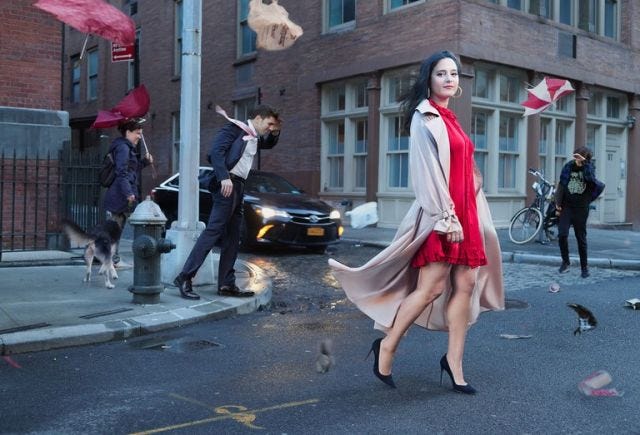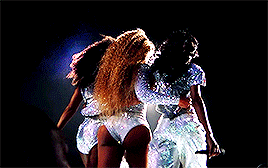The Bluestocking, vol 104: Stage left, alt-right
Happy Friday!
... and welcome to the reason that the last newsletter was delayed, which is that I went to Amsterdam just before Easter to watch an adaptation of A Little Life, Hanya Yanagihara’s laughably bleak novel.
This week's newsletter is almost as long as A Little Life, and contains equal parts of theatre wonkery and the Intellectual Dark Web, i.e. it probably sits in the middle of no one else's personal Venn diagram of interests except mine. I apologise.
I'm off now to record tomorrow's Saturday Review, for which I saw another play. One of such unrelenting awfulness that my criticism of it is going to make Stephen's infamous podcast review of I'm Not Running look like an advertorial. Saturday, 7.15pm, Radio 4.
Helen
***
A Little Life book is 800-odd pages of child abuse, sadism, self-harm, grief and suicide, which has been turned into a four-hour of play of such unrelenting misery and horror that a young man in the stalls fainted halfway through. Spark out. Bang. They had to stop the play - one actor delicately covering another actor, naked and bloodstained, with a lab coat - and bring up the house lights to carry the guy out. The cast seemed completely unfazed, which suggests this happens fairly regularly.
The reason that I wanted to see A Little Life is simple: I want to understand all the bits of theatre that aren't the text. Having studied English at university, I find lit crit is my default mode of approaching performances; it can also be easier to convey the nuances of dialogue than specific aspects of staging. But it's so important! I never forget that I'm mostly writing for an audience who will never see the play. So it's less a product review than an attempt to explore what makes this production interesting, how it pushes the artform forward, etc.
A Little Life was staged by the professional/romantic couple of director Ivo Van Hove and scenographer Jan Versweyveld. I'm writing about it as part of something bigger, but what was interesting to me was:
The actors mostly stayed on stage throughout. This isn't in itself wildly unusual - all the thousands of men in The Inheritance spent the whole 2 x 3.5 hours clustered round the raised rectangle of the stage. But here, each of the main characters - Jude and his three friends, his doctor and his adoptive father - got a zone of their own to retreat to. And each zone had paraphenalia appropriate to its occupant profession or personality (bed for the doctor, kitchen for the nurturing dad-figure, mini-studio for the painter). Each of them had their own little psychological space from which they could be drawn to take part in the action, and then return. It was both a neat way of externalising their minds, and a way to throw more emphasis on the main character. After all, as a kid, doesn't everyone imagine that people pop into existence whenever they're around?
Nothing fake, unless the fakery is obvious. The set was made out of actual stuff: boards, canvases, a sink. The kitchen worked (the other side of the audience got to eat some of the food, like those diners in Network). The music was pop songs. When Jude cut himself (which he did, a lot), there was no attempt to hide the blood bags. Even so, that guy at the back of the stalls fainted as red liquid spurted out. Impressive.
Video: everyone owns a smartphone, so stop treating it like it's inherently artistic, people. Weirdly, the only element that didn't really work in this production. There was a slo-mo footage travelling down city pavements at chest height. It just . . . was. It went a bit fuzzy whenever Jude was about to cut himself, but that was it. Oddly, I didn't massively enjoy the video in the Van Hove/Versweyveld All About Eve, either. Maybe this is how John Humphrys started? WHAT'S THE MATTER WITH JUST DOING THE PLAY, etc
Until next time...
Helen

same, except: a takeaway and The One Show
Bloomberg doesn't want this woman talking about her mug in court
"Mandatory arbitration, a common provision in employment contracts, forces workers to resolve complaints behind closed doors, without judges and juries. This spares bosses and shareholders from the embarrassment and cost of lawsuits. It also keeps victims from learning about each other and banding together, which means companies can avoid addressing systemic abuse. Wall Street was an early adopter, helping the industry mostly avoid the rush of #MeToo revelations in other industries.
Those accounts have helped spark a fight against mandatory arbitration. In February, Democrats in Congress introduced a bill to ban the agreements, and Google gave the right to sue back to its workers. Days later the judge in Stowell’s case rejected Cantor’s request to send her complaint to arbitration. The decision means she may get to tell jurors what women still face in certain corners of Wall Street.
“I wasn’t going to give in to them,” she says of her former colleagues, remembering the morning when she found her mug, a Mother’s Day gift, with poop in it. “I was like, you know what, if I make a big deal about it, they’re going to love it.”
Stowell, a single mom of six, cleaned it out and eventually filled it up with coffee again. “Of course I did,” she says."
Wild story, and certainly puts many other "bad days in the office" into perspective. And interesting to hear a reason why MeToo never hit Wall Street in the same way as the entertainment industry.

"Weiss’s growing visibility was galling to the hard-left Twittersphere. In February of last year, Weiss gave them an opportunity to show it. After Japanese-American ice skater Mirai Nagasu landed a triple axel, Weiss tweeted out a video of Nagasu, along with the caption, “Immigrants. They get the job done,” referencing a line from Hamilton. Nagasu, though a child of immigrants, was born in California. When this was pointed out on Twitter, Weiss tweeted back, “Yes, yes, I realize. Felt the poetic license was kosher.” Well, it wasn’t kosher. She was called a racist for the tweet. She also got the pronoun in the lyric wrong—it’s “Immigrants, we get the job done,” not “they.” “You ‘othered’ a U.S. citizen because she is not Caucasian,” tweeted someone. Weiss says she meant to celebrate both the skater and the idea of immigrants, but this was a good moment for a pile-on: “Bari Weiss is a professional Bad Opinion–haver.” “Fitting that her last name is Weiss.” Etc.
The magnitude of her crime ballooned into her own workplace. A handful of staffers at The New York Times took to their group-chat Slack channel to complain about Weiss. “That tweet denied Mirai her full citizenship just as the internment did,” wrote one staffer, who believed the tweet constituted one more “microaggression” within The New York Times. A transcript of the conversation was given to HuffPost, which posted it on the site under the headline leaked chat transcripts: new york times employees are pissed about bari weiss."
Have to say, I had mostly experienced Bari Weiss, a New York Times writer and editor, through the medium of people on Twitter complaining about Bari Weiss, or people on Twitter commenting on other people complaining about Bari Weiss. Now, I still think the whole "intellectual dark web" thing was a huge mistake as a piece of framing***, but it was refreshing to read her actual arguments rather than the Snarky Dunk version.
*** Why was it a mistake? Because it implied that these (mostly) rightwingers have been silenced, when a better way of putting it is that they have been exiled. It's now harder to be a high profile rightwing academic without attracting protests, definitely, and Jonathan Haidt makes a convincing case about why viewpoint diversity in academia is a social good.
But let's be honest here. Jordan Peterson has sold two million books. Ben Shapiro is getting $$$$ from conservative groups to speak in public, despite his expertise being . . . what, exactly? There is a whole ecosystem funding these guys: conservative foundations, endowed bits of US universities. And they're not doing scholarship or reporting, on the whole. They're polemicists.
An academic I admire enormously, Alice Dreger, asked to be left out of the Intellectual Dark Web piece. Dreger wrote a book, Galileo's Middle Finger, about research ethics (the transgender activists who doxxed and libelled a researcher whose book they disagreed with; the campaign against unnecessary surgery on intersex children, an anthropologist accused of exploiting his subjects, the Yanamamo). She has been through the social media wringer, and also resigned an academic job on a point of principle.
But she didn't want to be in the Dark Web piece. Her reasons are worth reading, and they boil down to the fact that she believes that opinions are being valorised over facts. "I am not interested in darkness or dark connections. I want intellectualism, journalism, scholarship, and government to be about light, transparency, and facts. Peer review, checks and balances, open access. Not about clicks and skirmishes and dramatic photos taken at sunset."
These guys are not in the dark. They're not! They're everywhere. And they are playing the cultural left like a fiddle by appropriating the idea that they're the only people in favour of free speech. But listen to the experience of Nathan J Robinson of Current Affairs magazine, who gets asked to debate them on college campuses. What Happens Next May Surprise You:
"I am hesitant to make allegations here, because I do not have firsthand familiarity with the internal negotiations and can only relate what I have been told by those who asked me to come. However, a recent example from Whitworth University shows the general tendency. The Young Americans for Freedom chapter at the school announced it was bringing Ben Shapiro. I received an email from a Whitworth student, Dean Ouellette, who was part of the school’s Poor People’s Campaign, asking if I could participate in a debate. I agreed. When the student approached the YAF, they instantly responded that their national organization (which was paying Shapiro’s $30,000 speaking fee) was unwilling to hold an actual debate."
OK, and let's have this bit too, because it's important:
"You can see how interested the right is in debate by looking at the behavior of right-wing media personalities. Ben Shapiro hosts a Sunday talk show in which all of his guests are conservatives. (He spoke briefly about having a socialist like Matt Bruenig on the program, but seems to have thought better of it.) Dave Rubin hardly ever has a liberal or leftist on his show (and on the rare occasions when he does, they are typically of the “I’m a Leftist but I spend all my time ranting about the scourge of Political Correctness” variety). Tucker Carlson has someone from the left now and then, but if they challenge him too seriously he’ll start swearing at them and refuse to air the segment. Bret Stephens will write long emails chastising random people who make fun of him, but completely ignores substantive criticisms of his work. Jordan Peterson dismissed the long Current Affairs dissection of his work with a couple of jokey tweets, and as far as I can tell has been completely silent on the devastating ContraPoints critique (though he is open to debating an unintelligible clown like Slavoj Zizek)."
This is all true! How often do you see real breadth of opinion, honest intellectual debate, on Fox News or wherever? How in the name of Satan's hairy nutsack did the left allow the right to "own" free speech when right-wing outlets are so relentlessly partisan? Niall Ferguson had to leave a free speech programme because he suggested that rightwing students do "opposition research" on a leftwing student, for god's sake. (Side note: do read that piece if only for the hilarious way that Ferguson and his favourite students talk to each other.)
As a chaser, here's Anne-Helen Petersen of Buzzfeed at the campus tour by Charlie Kirk/Candace Owens, funded by the rightwing Turning Points USA. Just look what happens when they bring someone on stage and offer them the chance to disagree with them: the guy says it's derogatory to refer to Alexandra Ocasio-Cortez as "the bartender" and Owens and Kirk just dunk on him by going, "but she WAS a bartender" in a wildly disingenous way, exploiting the fact they have a partisan audience cheering them on. Not to get all Marxist (although it would annoy them, so maybe it's worth it), but there is a wilful blindness to any idea of power imbalances going on here.
That piece is also worth reading because of how DESPERATE everyone in that room is to be persecuted by woke protesters. It's wild. That whole branch of ultra-conservativism is built on popping off against "victim culture" but they are LONGING to be victims of a leftist mob. What's that about?
That Buzzfeed piece has come the closest yet to convincing me that the left should just ignore these weenies. Any resistance just becomes fuel. Better to hold your own events championing your values than spend time and energy on counterproductive protests.
Quick links:
Do you want to watch three professional footballers play against 100 children? Of course you do.
"When we spoke recently, the men’s lawyer, Agustín Martínez, called the incident “consensual sexual relations among six adults” and suggested that the plaintiff only changed her tune out of fear the men would leak videos of the act and tarnish her reputation. Martínez said that anyone who suggested the plaintiff would not have wanted to have sex with five men she had met minutes earlier was denying her her freedom to do so." This report about a sexual violence trial in Spain is horrifying in its details, and for the fact that the incident (and the trial) are being exploited by the Spanish far-right. Once again, there are clear links between anti-immigration populism and anti-feminism. Imagine the difference in coverage and reaction if the five accused men had been Muslim asylum seekers instead of Spanish citizens.
"Žižek is, for lack of any better term, an actual philosopher. That is: he is deeply conversant with ideas and the scholarship, from Marx to Lacan to Christian theology. Yes, he is able to interpret these texts in novel and exciting ways. But more basically than all that, he has read them." Yeah, I'm still reading about that debate.
"Most students write something interesting, but every year a small number of people write what I call “the bad Marx paper.” [...] The student read the Manifesto, because it is short and doesn’t take very long. They didn’t read any other socialist texts. Eventually, they ran out of things to say about the Manifesto and filled up the rest of the word count with tankie bashing. This is what Jordan Peterson did with his half hour." Sorry not sorry here's another article on it, by a Cambridge politics PhD student. As a bonus, it functions as a short, critical guide to the Communist Manifesto, which I have not read, because, you know. Life.
Remember Hilary Mantel's wonderful lecture on royal bodies? Here's a version of her thesis playing out in Japan, where the Empress, a former trade negotiator, was banned from travelling because she hadn't produced an heir.
Guest gif: Going out without tights for the first time this year

See you next time! Also I am sorry for how long this is. Procrastination is a hell of a drug.

